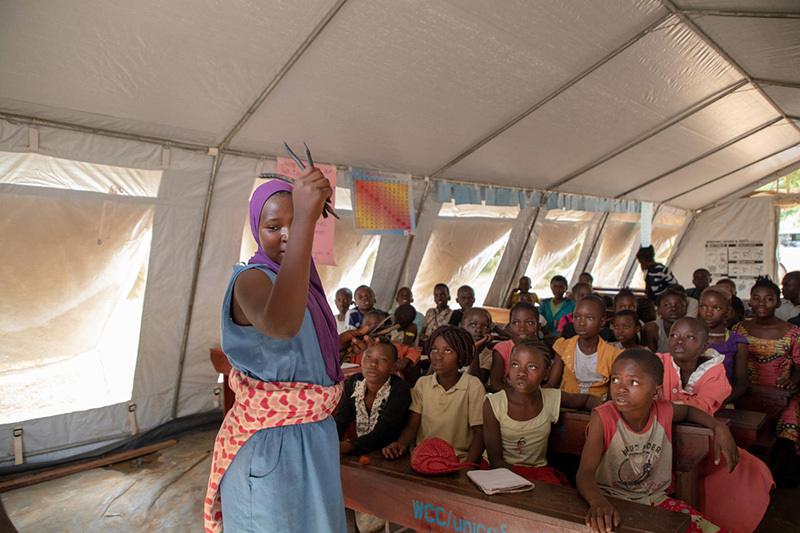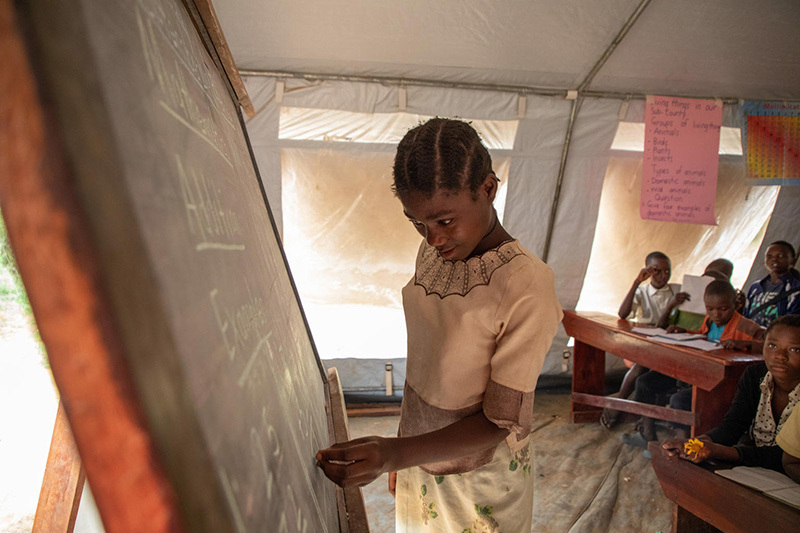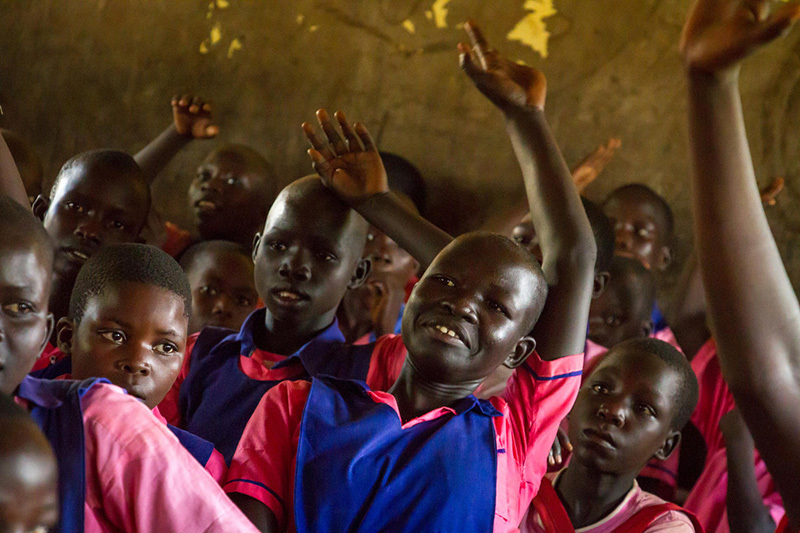Uganda approves project aimed at improving basic literacy
The project will first be piloted in 50 schools in two refugee-hosting communities that have different refugee populations; Arua hosts large numbers of refugees from South Sudan and Isingiro hosts large numbers from the Democratic Republic of Congo.
EDUCATION REFUGEES
In a bid to address poor learning outcomes, among children in refugee-hosting districts, the Ministry of Education and Sports has approved a new project aimed at improving basic literacy and numeracy skills for children in primary school.
The project funded by UNICEF will involve developing materials specifically for the context of Uganda and will be implemented by VVOB - education for development, with support from Teaching at the Right Level (TaRL) Africa.
The project will first be piloted in 50 schools in two refugee-hosting communities that have different refugee populations; Arua hosts large numbers of refugees from South Sudan and Isingiro hosts large numbers from the Democratic Republic of Congo.
In a second phase, the intervention will be scaled to 180 schools in the two districts, reaching a total of close to 105,000 adolescents.
The project is aimed at developing foundational skills in numeracy and literacy as well as transferable skills or ‘21st Century Skills' in adolescents aged 12 to 19 who are over-age for the grade they are placed in.
The project comes at a time when a 2018 Uwezo assessment across refugee-hosting districts showed that 33% of primary 3 and 5 students are unable to read more than one out of five English words.

Reports also indicate that about 68% of host primary 5 learners and 90% of refugee primary 5 learners in Arua and Isingiro are over-aged.
As a result, many refugee learners are placed in at least two grades below their age level, or the level they had reached in their country of origin - although this practice is not limited to refugee learners alone.
It is against that background that the partner organisations will implement TaRL a teaching methodology that aims to improve on the literacy and numeracy skills.
According to VVOB Country Programme Manager, Toon De Bruyn the project will be a success in Uganda basing on the fact that it has been a success in countries like Zambia where in 2019, the percentage of learners who can read a simple paragraph in their mother tongue increased in from 35% to 56%.
"For this project in Zambia, we also work very closely with TaRL Africa. We are excited to further extend this valued partnership now in Uganda, with UNICEF's support." De Bruyn says.
Anna Spector, Education Specialist at UNICEF in Uganda further expands on why UNICEF supports this endeavour: "With Teaching at the Right Level, we want to provide adolescents with an opportunity to catch up and acquire an appropriate level of foundational skills in mathematics and literacy, to allow them to either further their education or access job opportunities."
In addition to TaRL for numeracy and literacy, the implementers of the project will also integrate a component of life skills including problem-solving, decision making and communication skills, so that adolescents can receive additional support as they explore the future world of work.
Different from traditional teaching, under TaRL approach children, are grouped according to their level of learning instead of their age or grade.
Emily Cupito, Project Director at TaRL Africa, explains: "Children are taught at the level they are at and not where they are expected to be at their age or in their grade. Children from different grades and age can be taught together because they are at the same level."
This also means that a child can be at one level for numeracy and another level for literacy. Because teachers assess every child's progress regularly, each child can move from one level to another rather quickly.
Cupito highlighted an example whereby in class there could be children who can read a sentence, there are those who can read one word or a few letters. By focusing on teaching the letter-level child the next step, TaRL gives that child the tools she needs to advance to the next level.
The same applies to numeracy where children can be grouped in form of those who can only count up to 10, those who can count up to 100, those who can subtract among others.
De Bruyn concurs: "As we build their skills in the same learning level group, we can upgrade the group of the student as per their learning achievement."
Teaching under TaRL uses interactive teaching methods including games for learning and the use of simple materials such as sticks and ropes for learning activities.
He says: "In many TaRL classes, the floors, walls, and outdoor spaces become learning areas, much to the delight of the learners,"
In the Zambia and India model play money has also been used to increase understanding of number sense and improve financial literacy.
The programme is also designed in such a way that it is aligned with the curriculum.
"It will be implemented in such a way that it does not interfere with the existing timetable. Together with the Uganda Ministry of Education and Sports, we will decide how best to do this: either during the school hours, or after school or maybe even during the holidays, depending on what best suits the learners, instructors, and school authorities," De Bruyn says

Cleophus Mugenyi, the Commissioner Basic Education, and chair of the Education Response Plan for Refugees and Host Communities in Uganda (ERP) noted that the Ministry is keen to see that the programme succeeds and be introduced in other refugee-hosting communities and even in other schools across the country.
"To ensure this, we will work closely with the VVOB team at every stage and ensure that our officers in the districts and school staff are fully on board and trained to implement it," Dr Mugenyi says.
He adds that primary teachers will implement the teaching method.
"If needed, they will be assisted by volunteers from the communities. Our officers at the district level will be tasked to train, mentor and monitor their work. As a ministry we will be involved in every stage of the programme," Mugenyi says.
In 2007, Uganda introduced the ‘thematic curriculum' aimed to rapidly develop learners' literacy, numeracy, as well as life skills using languages in which the learners are already proficient and making use of themes of relevance to learners. Yet, learning outcomes remain low.
Mugenyi says the methodology is very effective for classrooms where children are at different learning levels.

"TaRL allows learners to quickly catch up and master basic skills in mathematics and literacy, which are necessary for learning in other subjects. As such the programme contributes to the acquisition of relevant competencies by learners," Mugenyi says.
He hopes that the programme responds to the learning gaps in literacy and numeracy.
"It is our aim that, by the end of the project, all learners in the schools targeted by the project, whether Ugandan nationals or refugee learners will have the expected foundational skills to read, write and calculate, to further their learning or to find work so that they can become productive members of society," Mugenyi says.
The project will also adapt the content of TaRL materials to the conditions faced by learners in refugee and host communities in Uganda.
Most importantly, the project team will closely cooperate with relevant staff of the National Curriculum Development Centre (NCDC) to align the materials with Uganda's thematic curriculum.
Every child has a right to quality education and teaching inclusively can contribute to achieving that goal.
Uganda is one of the largest refugee-hosting nations in the world, hosting 1.31 million refugees and asylum seekers according to the United Nations High Commission for Refugees (UNHCR).
In Uganda refugee, learners attend school together with their Ugandan peers. As a result, many schools in hosting communities have doubled in size, some have even increased fourfold.
About Teaching at the Right Level (TaRL)
Teaching at the Right Level (TaRL) is a teaching methodology designed to help learners master basic skills in literacy and numeracy.
It was created by the Indian educational NGO Pratham, and it has been implemented with great success in many environments, including Zambia.
It works best for Grade 3-5 students, who often have a variety of learning levels. Teachers conduct regular assessment of each child using a simple, one-on-one assessment tool.
Unique to the Ugandan case, in addition to TaRL, the programme materials will also include life skills education.
In the thematic curriculum, these are defined as "the skills that help children to flourish within their social and physical environment and make the most of the environment to ensure a healthy and happy life".